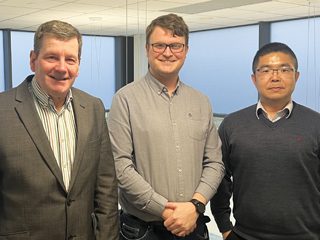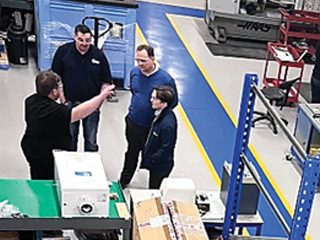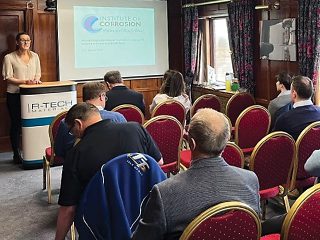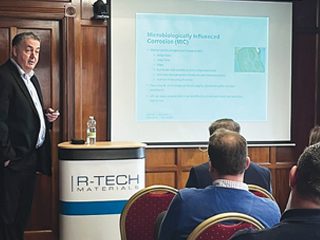The cart is empty!

Advanced Training Opportunities in Passive Fire Protection
Mastering Passive Fire Protection with Specialised Training
Passive Fire Protection (PFP) is a discipline that goes far beyond the requirement for compliance with international standards. It’s a critical element in the oil, gas, and energy sector, and crucial in the safeguarding of both assets and, most importantly, personnel.
Advanced training in PFP equips those aspiring to pursue rewarding careers as PFP Inspectors with a detailed understanding of fire dynamics, materials and products used, approvals and qualifications of products to meet project safety requirements, and best practices that are essential to ensure structures and personnel are protected.
The ultimate benefit? When you qualify through the advanced PFP training routes offered by ICorr’s PFP courses, doors open to a career marked by demand, respect, and the potential to make a real difference in safety and protection of assets.
Read on to discover why the ICorr Fire Protection Coatings Inspector Training Course stands out, and the depth and breadth of content the course includes.
Why Do ICorr PFP Inspector Training Courses Stand Out?
The landscape of PFP is constantly evolving, and the need for specialised and advanced training is undeniable. The ICorr PFP Inspector Training Courses distinguish themselves with several key elements that set them apart from other PFP courses.
The first key differentiator is how the courses were developed in partnership with PFPNet, an independent industry group specialising in passive fire protection within the oil, gas, and energy sectors. This collaboration has ensured the course curriculum is grounded in the latest industry standards.
In addition, the course content has benefitted from PFPNet’s access to a membership with an unequalled depth of theoretical and practical knowledge, understanding, and experience. Such a foundation provides those who take the course with an unmatched resource of insights regarding PFP installation.
“The course allowed me to understand the differences between paint and PFP, and why recognising these differences is critical.” – Course participant.
These courses delve into the many material types used in PFP, emphasising the critical nature of product qualification to ensure that systems meet the stringent requirements for fire protection.
“A detailed and comprehensive course in all the key elements for installation of PFP materials.” – Course participant.
The Level 3 training goes beyond merely presenting the correct methods of material installation. It also addresses potential complications that can arise during the installation phase. This comprehensive approach means that those who qualify can identify and rectify issues to ensure the integrity of the installation.
If you want to excel and stand out in the field of PFP inspection, it is elements like these – as well as a focus on troubleshooting and problem-solving – that raise ICorr Level 3 PFP Inspector Training above the norm.
“The course provided good detail of what can go wrong in addition to what are the processes of installation.” – Course participant.
Level 3 PFP Course Content: A Deep Dive into the World of PFP
You’ll find that the Level 3 course delivers a comprehensive curriculum that will arm you with a deep understanding of PFP and its role in the oil, gas, and energy sector. It’s structured as a progressive narrative, blending theoretical knowledge with practical insights to ensure a well-rounded learning experience.
Here is an overview of the key components of the course content:
· Role and Duties of the PFP Inspector
This initial segment lays the groundwork, outlining the fundamental responsibilities and expectations placed upon PFP inspectors.
· Introduction to PFP
You’ll be introduced to the core purpose of PFP, helping you to understand its significance in safeguarding lives and infrastructure.
· PFP Types
The course continues with a broad introduction to the diverse types of PFP before delving into a more detailed overview, providing a clear understanding of the spectrum of PFP solutions available.
· PFP of Structures, Divisions, Processes, and Storage Vessels
A focused look at how PFP is applied to different structures and components within the industry.
· Classification Society Type Approval, Other Types of Approval (e.g. UL)
An exploration of the approval processes for PFP systems, including the significance of certifications and weight, is important for an Inspector to understand approvals and certifications.
· Qualification of PFP Systems
This section underscores the importance of supporting documentation in qualifying PFP systems, highlighting the need for rigorous validation.
· Development, Testing, and Approval of PFP Materials and Systems
You’ll learn about the journey from development to approval of PFP materials and systems, understanding testing protocols and criteria for approval.
· Epoxy PFP Degradation Mechanisms
An examination of the factors that contribute to the degradation of epoxy PFP, and how that is prevented to ensure that products meet the expected fire performance in the event of a fire.
· Application Defects and Fire Performance Implications
Insights into common application defects and how they can compromise the fire performance of PFP systems.
· The Specification Process
A deep dive into the specification process, covering aspects such as relevance, potential errors or omissions, and the importance of adhering to the epoxy PFP manufacturer’s application manual.
· Pre-job Meeting, ITP, and Quality Control
Emphasis on the significance of pre-job meetings, Inspection Test Plans (ITP), and maintaining quality control at all stages of application.
· The Critical Importance of Good Surface Preparation
Highlighting surface preparation as a foundational element for effective PFP application.
· Epoxy PFP Application Equipment
Overview of the types of application equipment and the checks Inspectors can perform to ensure proper application.
· Final Inspection: Role and Duties of Epoxy PFP Inspector
A focus on final inspection criteria, including build of thickness to achieve specification, topcoat application, and revisiting the role and duties of the epoxy PFP inspector.
· Safety Overview
A crucial component of the course, providing a comprehensive safety overview to ensure all practices adhere to the highest safety standards.
· Qualification Process
The course includes a practice test followed by a final examination consisting of 150 multiple-choice questions. On successful completion of the test, candidates for Level 3 will be invited to attend a peer review with an industry specialist to assess their understanding from the course and discuss how they would operate as an Inspector on a project.
Should You Attend this Course?
If you’re a specialist inspector or technician seeking to demonstrate your distinctive competence to properly understand and inspect PFP installations in new construction or retrofit situations, the Level 3 course is for you.
As correct surface preparation, priming, and top coating are crucial requirements in PFP installation, you should have a minimum of ICorr or NACE Level 1 to demonstrate your fundamental understanding of corrosion and protective coatings.
What’s Your Next Step?
In the critical field of Passive Fire Protection (PFP), ICorr’s PFP courses stand out by offering comprehensive and advanced training to meet the needs of today’s oil, gas, and energy industry. Developed with the expertise of PFPNet and focusing on real-world application, these courses prepare you for a rewarding career in PFP, protecting both infrastructure and personnel.





